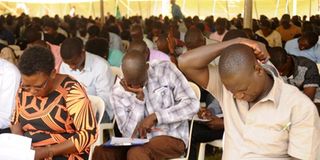Prime
Why Africa is undeveloped

Candidates take an aptitude test for Public Service jobs at the Mandela National Stadium in Kampala recently. FILE PHOTO
What you need to know:
Development. Africa is not where it is because of colonialism, the stringent conditions put on aid and loans by the World Bank, IMF and other development and financial agencies. Even the common argument about our leaders being “bad” or corrupt is not sufficient to explain our underdevelopment, writes Timothy Kalyegira.
God said ‘Let there be light’, and there was light. God saw that the light was good, and he separated the light from the darkness.” (Genesis 1:3-4; Moffatt translation, 1948)
How does a country develop? What is development, in the first place?
One way to start this journey of trying to understand how a country or how anything develops, is the example of that quote above from the Bible.
Even if one does not believe in the Bible, in God or the Christian religion, the logical flow of the story of creation as told by the Bible is unmistakable.
It all starts with and in the mind. Nearly everything we do starts with the mind.
When we wake up in the morning, our very first steps through the way begin with our minds – checking the time, dreading a tense meeting with the boss, wondering what’s for breakfast, checking to see if we have transport cash to get into town and back, checking our phones for text or social media messages that might have come in last night as we slept, and so on.
So is it with economic development of a country or the creation of the world and the matter in the universe.
Premeditated concept
It starts as a premeditated concept. It starts with a mental vision of what should be and why it should be.
Before there was light, there was in God’s mind the notion of a spectral band of energy called light and its illuminative qualities.
All this was worked out in the divine mind and the creation of light was one of the very first steps in the birth of the universe.
The reason Africa is an undeveloped continent is not because of a lack of mineral resources or money but because something has not yet started in the mind.
Something has not developed coherently or fully in our minds at every level.
The collective minds of Africans, their leaders, their craftsmen, traders, institutions, culture and the wider society have not yet arrived at the point of “seeing”, sensing, knowing and wanting the things that put together form what we know as a developed society.
Africa is not where it is because of colonialism, the stringent conditions put on aid and loans by the World Bank, IMF and other development and financial agencies.
Even the common argument about our leaders being “bad” or corrupt, while it resonates with our sentiment and to a large degree the facts of governance around us, it is not sufficient to explain our underdevelopment.
My belief is now more than ever that it has to do with intellect, cognition, mental processing. That thing, in other words, commonly known as IQ or intelligence quotient.
IQ is not what most of us think it is. It is not just being able to read or write or having completed secondary school, university or gone on to earn a Master’s degree.
At its core is the ability to learn, grasp concepts and mentally put A and B together to get the outcome or possibility AB.
Let’s say I live in Jinja and notice that mini-vans full of European tourists keep flocking to the source of the River Nile to take photos or just to enjoy the scenery.
I decide to start a kiosk selling mineral water bottles, crafts or T-shirts themed around Uganda and locate it at the source of the Nile.
What I have just done is a basic manifestation of my IQ. I have clearly seen that I stand a good chance of selling my ware at the source of the Nile.
That ability to see A and relate it to B is what IQ is mainly about.
That is why many semi-literate people tend to be more industrious or productive in life than many well-educated people.
School and university exams typically address set-piece, time-bound questions and projects.
They test for the retention or classroom knowledge and the ability to reproduce it in the tense atmosphere of exams over three hours.
To a large degree, it takes average or above average intelligence to be able to sit and pass exams.
But academic success is only one aspect of intelligence.
For example, to meet a person interested in you and evaluate whether or not they would make a right husband or wife for you requires a range of mental steps that are different from answering an engineering, law, medicine or journalism exam question.
Some can’t see past physical beauty and realise that nobody will look 21 forever or that childbirth could radically change the hourglass figure that you see today that is the whole basis of your decision to marry her.
Others base their decision on his present career or the car that he owns, unable to foresee that his company could one day be outcompeted by rivals or that the same money that you like in him today will be attractive to many other women too – and so the unending lamentation by women about cheating husbands.
That faulty decision-making in relationships is a sign of average IQ, even if the people in question might be PhD holders.
IQ is not taught in class. It comes from a native, interior perception. IQ and good education or impressive academic qualifications look a very similar to each other, but they are not always one and the same thing.
Weakest in the matter of IQ
My view then is that across Africa, we are at our weakest in the matter of IQ, and this includes our top PhDs, MBAs, media, political scientists, lawyers, economic planners and others among the “elite”.
Our difficulty with making connections between events, possibilities, situations and forming in our minds the picture of the outcome when A is applied to B, is our crisis.
High IQ, much more than good grades or top academic qualifications, is the best measure of what a person is and what they will or can achieve in life.
To make matters worse, our entire government, academic, corporate and social system focus on academic qualifications and work experience rather than identifying high IQ.




